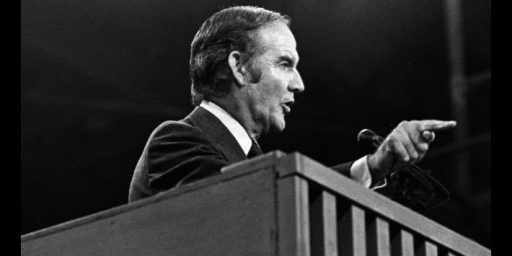DEAN, DEAN, EVERYWHERE DEAN
Howard Dean’s surprise showing in the fundraising wars and unscientific online polling has captured the imagination of the punditocracy. Bill Kristol was practically gushing at Dean’s political prowess on last night’s Fox Special Report. Several more columnists have weighed in this morning. In addition to the Kaplan piece excerpted in the last post:
E. J. Dionne thinks Dean is the model of the modern major Democrat, with information vegetable, animal, and mineral.
Dean’s astonishing success at pulling in such a large haul of online contributions so early in the campaign is revolutionary. It gives Democrats an alternative to their addiction to raising big money from rich people and rich interests. Most of that fund raising will be against the law if the U.S. Supreme Court upholds the Campaign Reform Act passed last year. So the Dems had better figure out something.
Although a rather interesting caveat:
Let’s stipulate: (1) It’s still not clear what kind of president Dean would make; (2) the press always overrates fund-raising prowess; and (3) where money is concerned, we’re still relying largely on the Dean campaign’s calculations.
Those caveats don’t change the fact that what Dean has set in motion will long survive this campaign. Even if he loses, Dean will be seen as a political innovator as John F. Kennedy was in understanding the power of television and both Barry Goldwater and George McGovern were in using direct mail fund-raising.
Hmm. A Democrat who loses but figures out how to raise money more efficiently so that others can copy it later. I think Karl Rove can live with that.
Tod Lindberg is impressed:
Mr. Dean is the first authentic phenom of the 2004 presidential election. When he first hit the campaign trail about a year ago, most of Washington treated him as a novelty candidate: possibly a source of a certain amount of comic relief, but certainly nothing more. The first tier belonged to senators and the House minority leader, not to a former governor from a state ranking 49th in population.
But it quickly became clear that Mr. Dean was different. His unabashedly populist economic message, his opposition to the Iraq war, his thoroughgoing contempt for the Bush administration and his deep-seated conviction that the Democratic Party was losing its way were having a galvanic effect on the hard-core partisans who get interested in presidential politics two years before the election.
Democrats’ losses in the 2002 election became the objective correlative of the Dean campaign message. A play-it-safe Democratic strategy predicated on the notion that the party out of the White House always loses seats in the mid-term election was blown up by the daring Republican strategy of putting President Bush’s popularity on the line on behalf of GOP Senate candidates. When Republicans retook the Senate, Mr. Dean had the best story line accounting for the Democratic failure.
But, alas, Lindberg damns with faint praise:
Even if Mr. Dean’s diagnosis of what went wrong in 2002 is accurate, it doesn’t follow that firing up the base at risk of the center makes sense in a presidential election year, when perhaps more than 50 percent of eligible voters will turn out to vote rather than the 36 percent to 38 percent typical of a mid-term.
But Mr. Dean is about conviction, not strategy — or rather, his strategy begins with conviction.
This didn’t work so well for Goldwater or McGovern but, hey, it’s fun.
Susan Estrich is surprised.
The first primary is about money, and Dean did “Better Than Expected” when he raised more than any other Democratic presidential candidate in the last three months. He caught the punditry by surprise, which is more important than beating everybody. As recently as a day before the news was announced, some insiders were still relegating him to the second tier. No more. It may not be long before he’s the man to beat.
It doesn’t actually matter that Sen. John Kerry of Massachusetts has raised more overall money or that the former Vermont governor is still fifth, on the whole.
She thinks the expectations game works both ways, though.






More astonishing to me is E.J. Dionne’s misunderstanding of the way campaign finance works. Dean raised his money the old fashioned way, JUST LIKE EVERY OTHER CANDIDATE who is running for office.
Party Money and Candidate Money are two different issues.
—